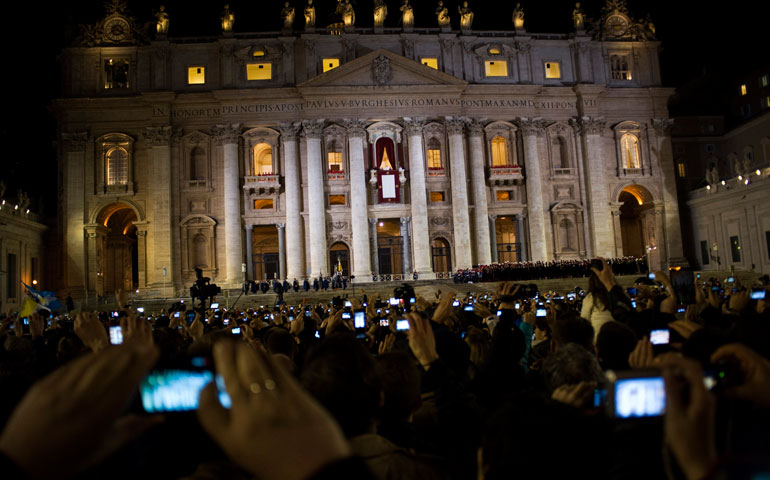
(Newscom/Polaris/Antonello Nusca)
Diana Butler Bass, a renowned religion scholar and writer, explained the difference between Christianity as an institution and Christianity as the people of God, the topic of her book, A People's History of Christianity: The Other Side of the Story, at Rockhurst University here March 18.
Bass said it had been a while since she talked about this book, published in 2010, but the election of Pope Francis made it timely again, and she used it to illustrate her point.
She began by showing two photographs taken during Francis' first appearance on the balcony of St. Peter's Basilica on March 13, the night he was elected.
The first, taken from behind the pope, shows him looking out from the balcony at the "sea of humanity" before him, holding what seem to be candles or lights. This photo, Bass said, represents Christianity as an institution, formidable and with a respect for authority and structure.
The second photograph was taken from within the crowd looking up at the new pope, showing a great diversity of people. One can see that they are not waving candles, but "holding up their iPhones and their iPads, taking a picture of this great scene to prove ... they were actually in Vatican Square when this great event happened," she said.
"From what perspective do we tell the story?" Bass asked. "Do we tell the story from the balcony? Or do we tell the story from the crowd?"
She argued that Christianity has been seen as an institution with a history that spans centuries, filled with instances of how "nations, wars and political parties shaped people over many years." The main idea behind this context is of people following the authority of a religious leader or leaders.
Entering into the 21st century, however, the more appropriate perspective is that of the church as a people of God, Bass said.
"Although it is still a strong religious tradition worldwide and still the largest religion in the world, it has lost its place of privilege and power in the West," she said.
She showed a photo of an older woman kneeling in the pews of a church by herself and said this is becoming more common in Western Europe and North America, where Christianity used to be widespread.
Because more Americans are distancing themselves from organized religion entirely, Bass said there is more doubt about the nature of church and Christianity itself.
"More than 20 percent of Americans consider themselves to be unaffiliated, people who have no religious identity at all," she said.
It is through this distancing, Bass said, that the context of the church as an institution is "no longer adequate."
She then presented the idea of church as the people of God, saying that this is not ignoring the centuries of history and authority, but it is presenting the church in a different way, the way of love, justice and community. The main idea behind this context is the love of God and love of neighbor, she said.
To illustrate this in her book, Bass uses three different kinds of people. The first group includes Augustine, Thomas Aquinas and Martin Luther. Though they are typically viewed as players in the old context, Bass draws from "unused or neglected insights" that could make a difference to the people of God today.
The second group includes Perpetua, Francis of Assisi and Dorothy Day, those viewed as "admired resisters" who, because of challenges to the institutional church, were looked down upon when the church was not on the right path. According to Bass, they are admired because they did something "deeply heroic that still captures our imagination."
The third group consists of people who are rarely heard of in the history of Christianity. She said this includes "the Alexandrian Washerwoman," a figure in the mural "The Dancing Saints" at St. Gregory of Nyssa Episcopal Church in San Francisco that represents the holiness of the ordinary and routine; the Beguines, groups of laywomen who served the poor during the 13th century, beginning in the Netherlands; and the Rev. Samuel Green, a freed slave who was jailed in 1857 in Maryland for possessing a copy of Harriet Beecher Stowe's Uncle Tom's Cabin.
Bass' point is to show these Christian figures in the context of the love of God and love of neighbor. Bass said she believes Christians of today are seeing, responding to and understanding the world more in this context than in the previous one.
In the example of St. Francis, she pointed out that no one she has met can remember the name of the pope who gave his blessing to Francis and the Franciscans, but Francis is arguably one of the most iconic figures in Catholicism and Christianity.
Bass said this is why it was so telling when the new pope chose the name Francis, signaling "spiritual renewal, heroic change, a love of commitment to the poor, and an affection that burrows into the hearts of faithful people."
Presbyterian Amanda Mackey, of Shawnee, Kan., and recent graduate of Simpson College in Indianola, Iowa, follows Bass on Twitter and is considering entering ministry, so she came hoping to look at church in a different way to reach younger generations.
"She is coming to my church to speak in April, but I can't make it so I came to this lecture," Mackey said.
Vern Barnet of Kansas City said it was his first time hearing Bass speak. He said she presents a compelling model for the kind of history of the faith that needs to be told in today's society.
"So many writers, liberals and critics, have focused on the problems, but not a lot of attention [has been paid] to people of faith [who are] not in the establishment that have continued to keep faith alive through the love of God and love of neighbor," he said.
About 50 people attended Bass' lecture and reception afterward, which was a part of Rockhurst University's Visiting Scholar Lecture Series.


